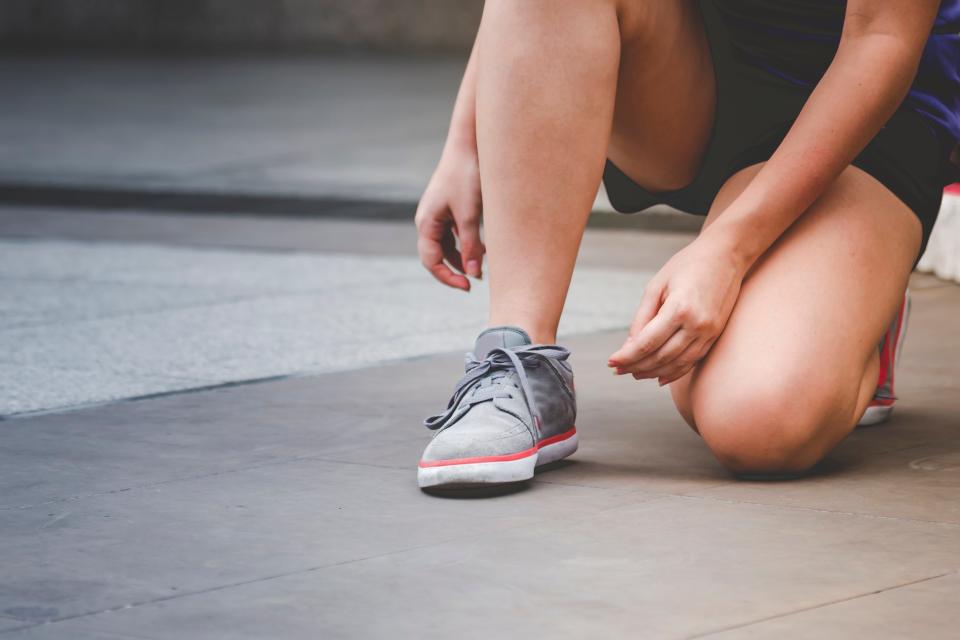Ervolino: Tiptoeing around shoe etiquette, pathogens and babies
“We have a baby,” my brother Don reminded me, two weeks ago, staring down at my shoes.
“We do?” I asked, as I tried, unsuccessfully, to get past his front door so we could have lunch.
Don was referring to Hunter, his grandson — and my great-nephew — who celebrated his first birthday in January and now scurries all over the place.
And this means …?
“No shoes,” Don said, pointing to my black, steel-toe lace-ups.
My favorite footwear, more commonly known as work boots, was an endless source of amusement to my late — and frequently annoying — father, Emilio, who asked on more than one occasion, “Why do you wear work boots? You don’t even work.”

“I do work. I’m a writer.”
“You call that work?” he would ask.
And then we wouldn’t talk for a week.
(Which was fine with me.)
More Ervolino: DNA testing can find hidden connections
Back at my brother’s house, I was crouching down to unlace my lace-ups — no easy task these days.
I can still crouch pretty well. Standing back up again is the complicated part.
“Sorry about all this,” my brother said, referring to the de-shoeing request, “but we’re concerned about Serratia ficaria.”
“Is he coming for lunch, too?” I asked.
(I thought we were talking about someone on CNN.)
“No,” Don said, “Serratia ficaria is a pathogen commonly found on shoes. It causes respiratory infections, soft tissue infections, UTIs …”
“Oh,” I replied. “Well … we wouldn’t want that to happen …”
Don nodded. “Since the baby was born we’ve become a lot more concerned about pathogenic microorganisms. Serratia ficaria. Staphylococcus aureus. E. coli …”
“I totally understand,” I said, super-eager to change the subject. “So, what’s for lunch?”
“Clostridium difficile …” Don continued.
“Oh, is that a salad?” I asked. “Clostra … what did you call it? Didium? Is that the one that tastes like arugula?”
“No, Clostridium is another pathogenic microorganism commonly found on dirty shoes. It causes severe bloating and other gastrointestinal problems. We can make you a nice salad, though.”
“Sounds good,” I said.
“So, yeah, we’re having pasta primavera and grilled chicken. And salad. And … where was I? Oh, yeah. I’m sure you know what E. coli is. It’s often picked up in public restrooms. Although, now that you mention it, some people do get it from salads. I think there was a big outbreak last summer.”
I promised not to step in my salad, just in case. But my brother, who once got annoyed when a host asked HIM to remove his shoes, couldn’t change the subject. He was on a microorganism rampage.

Apparently, he said, a survey done last year found that one out of three Americans do not take off their shoes when entering their home.
Sacré bleu!
Then, in November, the TV news magazine “Inside Edition” tested the shoes of a young woman who said she walks about 10 miles a day.
This is the same news show that recently ran footage of a man playing the guitar while he was having brain surgery.
(And, in case it matters, I haven’t walked 10 miles in the last four years.)
As my brother noted, “The results of this woman’s shoe swab showed a bacterial count of 880 million. They found five different types of bacteria in her sample, two of which are found in … you know … poopy-doopy.”
Poopy-doopy?
(I love the way the vocabularies of grown men change drastically when there are little children around.)
“Yes,” Don said, with a wink. “Poopy-doopy, if you get my drift.”
“Oh, yes, I doodie doo-doo,” I replied, winking back at him.
Ten years ago, I did a feature story on this subject and was surprised at how many folks said they ALWAYS make guests remove their shoes at the door.
As one woman noted, “I like to walk around barefoot and I like my floors to be what I call ‘barefoot clean.’”
On the other side of this argument was a man who said, “When I was 18, my crazy aunt told me and my brother to take our shoes off before we could go in her living room. So I told her to go jump in a lake.”
Another respondent referred to this practice as “a generational thing. I’ve noticed that younger guests almost always take off their shoes when they enter the house, while the older guests do not.”
Of course, taking off your shoes at the door doesn’t mean those shoes will be any cleaner when you leave.
Some manufacturers suggest using disinfectant sprays, peroxide, rubbing alcohol and/or bleach to sanitize shoes and sneakers.
What you use depends on the items being cleaned. Just don’t use all of them at once, or you may blow up New Jersey.
As for me, I only once asked a friend to take off his shoes, and he yelled, “Why? Your floors are all dusty!”
I said, “Yeah, I know. I want to spray Pledge on your socks.”
He declined.
This article originally appeared on NorthJersey.com: Don't want a sick baby? Leave your shoes, deadly pathogens at the door
